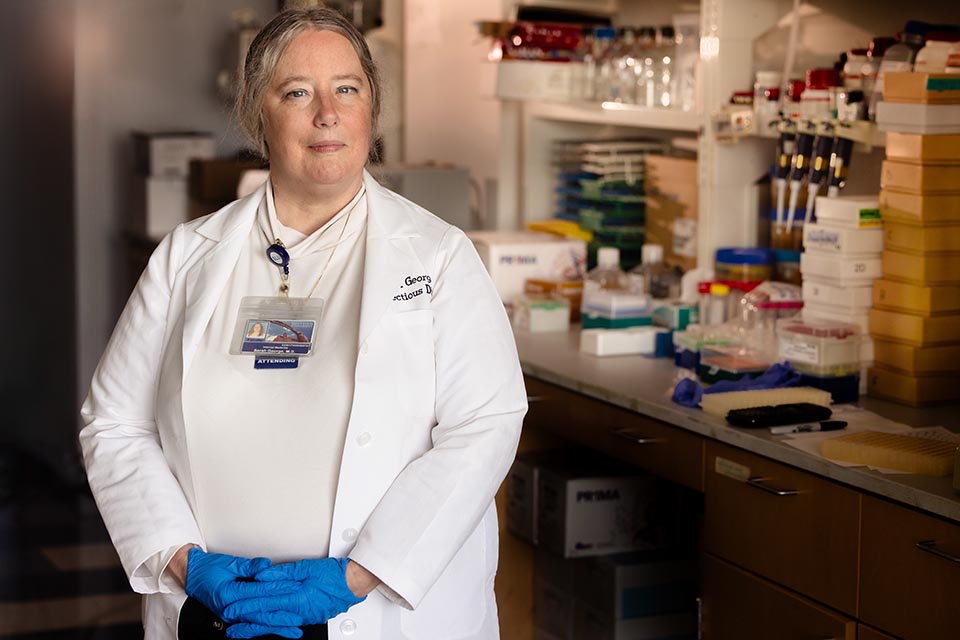SLU Research: PTSD Is a Modifiable Risk Factor for Type 2 Diabetes, Related Adverse Outcomes
ST. LOUIS — Patients with post-traumatic stress disorder (PTSD) and type 2 diabetes have worse glycemic control, increased risk of hospitalization, and poorer self-reported health compared with type 2 diabetes alone, according to a Saint Louis University study.
The study, published online Aug. 13 in JAMA Network Open, shows that treating PTSD is associated with better overall well-being and lower risk of some chronic health conditions, including type 2 diabetes.

Jeffrey Scherrer, Ph.D., professor of family and community medicine and professor of psychiatry and behavioral neuroscience at Saint Louis University School of Medicine. Scherrer is also co-director of research for SLU’s Advanced HEAlth Data Research Institute. SLU file photo.
“To our knowledge, this is the first evidence that PTSD is a modifiable risk factor, albeit a modest one, for some adverse diabetes outcomes such as microvascular complications,” said Jeffrey Scherrer, Ph.D., professor of family and community medicine and professor of psychiatry and behavioral neuroscience at Saint Louis University School of Medicine, the paper’s senior author.
Scherrer is also co-director of research for SLU’s Advanced HEAlth Data (AHEAD) Research Institute, a center that addresses public health issues to improve patient health outcomes through data-driven innovation.
"This is further evidence that we should not separate mental from physical health. Treating the whole patient with comorbid PTSD and diabetes should address both conditions to optimize outcomes. Screening for and treating PTSD as part of diabetes care may lead to better clinical outcomes for both conditions," he said.
In this retrospective study, Scherrer and his co-authors collected patient data from 2011 to 2022 from the Veterans Health Administration (VHA). The data sets were comprised of 10,002 VHA patients, ages 18 to 80, with comorbid PTSD and type 2 diabetes.
Scherrer and his co-authors observed that when patients’ PTSD improved to a level where they no longer met the criteria for PTSD, that improvement was associated with an 8% reduction in risk for microvascular complications compared to those who continued to meet the criteria associated with a PTSD diagnosis. Among those ages 18-49, but not among older patients, no longer meeting PTSD criteria was linked to a significantly lower risk of insulin initiation and all-cause mortality.
PTSD is a metabolic disease related to the body’s inflammatory response. Scherrer and his co-authors found that it is possible that physiological abnormalities in the hypothalamic-pituitary-adrenal axis, changes in metabolic hormones, poor diet and a lack of exercise could explain the connection between PTSD and prediabetes and type 2 diabetes.
Other authors include Joanne Salas, of the AHEAD Research Institute, Saint Louis University School of Medicine; Wenjin Wang, of the Department of Family and Community Medicine, Saint Louis University School of Medicine; Kenneth E. Freedland, Ph.D., of the Department of Psychiatry, Washington University School of Medicine; Patrick J. Lustman, Ph.D., of the Department of Psychiatry, Washington University School of Medicine; Paula P. Schnurr, Ph.D., of the National Center for PTSD, White River Junction, Vermont, and the Department of Psychiatry, Geisel School of Medicine at Dartmouth, Hanover, New Hampshire; Beth E. Cohen, M.D., of the Department of Medicine, University of California San Francisco School of Medicine and San Francisco VA Medical Center, San Francisco, California; Allan S. Jaffe, M.D. of the Department of Cardiovascular Medicine and Department of Laboratory Medicine and Pathology, Mayo Clinic, Rochester, Minnesota; Matthew J. Friedman, MD, Ph.D., of the Department of Psychiatry, Geisel School of Medicine at Dartmouth, Hanover, New Hampshire.
This study was supported by grant R01HL160553 from the National Heart, Lung, and Blood Institute.
Latest Newslink
- A Camp Friendship that Stirred Up Lifelong BondsIn the summer of 2005, Mary Kate Keenoy (Chaifetz Grad '22) and Genevieve Willman met at SLU's Gardens to Tables culinary camp. What started as a shared interest in cooking grew into a lasting friendship that has endured for two decades.
- Bruce Bacon, M.D.: 1949-2025Bruce Bacon, M.D., professor emeritus of internal medicine, died Sunday, July 6, 2025. He was 75. Bacon was known globally for his expertise in all aspects of clinical hepatology, specifically hemochromatosis, viral hepatitis, chronic liver disease / general hepatology, and liver transplant. Bacon was also a member of the research team that discovered the gene for hemochromatosis, HFE, in 1996.
- SLU Launches William L. Clay, Sr. Institute of Civic Engagement and Economic JusticeThe Clay Institute will provide immersive learning experiences and hands-on training that address the social and economic challenges facing the St. Louis region and the nation. Institute programming will be available to all students with an interest in civic engagement and democratic participation.
- SLU Research Explores Depression's Ripple Effect on DiabetesA study conducted by researchers at Saint Louis University found that patients with depression were more likely to have uncontrolled diabetes over time and that depression contributes to a heightened economic burden to diabetes management.
- SLU/YouGov Poll: Statewide Cell Phone Ban for Missouri Schools Popular with VotersGovernor Mike Kehoe has signed Senate Bill 68 into law, enacting a statewide ban on the use of personal electronic devices, including cell phones, tablets, and smartwatches, throughout the school day in Missouri public and public charter schools.
- SLU Vaccine Center Will Enroll Healthy Volunteers in Yellow Fever Vaccine Clinical TrialSaint Louis University's Center for Vaccine Development will enroll up to 70 adult volunteers in a clinical trial to study the safety elicited by a new investigational vaccine for yellow fever, a potentially deadly disease that is spread by mosquitoes. The research is funded by Sanofi Pasteur.













